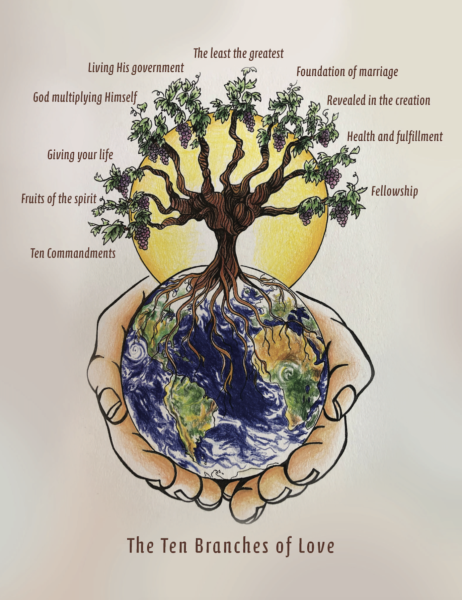
The Expansiveness of God’s Love
It Knows No Limits, Nor Can Be Contained By Anything
“For love is as strong as death….
Many waters cannot quench love,
Nor can the floods drown it.
If a man would give for love
All the wealth of his house,
It would be utterly despised.”
(Song of Solomon 8:6-7)
While Solomon in this quote was addressing primarily the love of a husband for a wife, the concept goes much deeper than that and relates directly to our relationship to our heavenly Father and Jesus Christ, as we shall soon see. “For love is as strong as death….”
A full understanding of the magnificence and pervasiveness of God’s love is impossible for us humans, even though we can see the evidences of that magnificence in the creation. The animals, birds, fish, trees, grass, flowers, rocks, minerals, clouds, rain, and everything around us — and mankind as well — cries out proof of the Creator’s incredible design and power … and his lovingkindness throughout the biosphere that sustains us physically. Without that wonderful sustaining creation we could not exist. We owe everything to Him.
We have all read and pondered the meaning of what the apostle John wrote concerning love. Let us explore this meaning of love in its deepest contexts as it related directly to us personally. Look first at I John 4:7-11.

“Beloved, let us love one another, for love is of God, and everyone who loves is born [gennao, ‘begotten, procreated’] of God and knows God. He who does not love does not know God, for God is love. In this the love of God was manifested toward us, that God has sent His only begotten Son into the world, that we might live through Him. In this is love, not that we loved God, but that He loved us and sent His Son to be the propitiation for our sins. Beloved, if God so loved us, we also ought to love one another.”
love = agape, “the affection shown by God towards His Son, the human race, and believers in Christ.”
propitiation = hilasmos, “expiation, a means whereby sin is covered and remitted.”
This is the love that centers about the “great commandment in the law”: “‘You shall love the Lord your God with all your heart, with all your soul, and with all your mind.’ This is the first and great commandment” (Matthew 22:37-38; Mark 12:30; Deuteronomy 6:4). John then mentions the second commandment, “You shall love your neighbor as yourself,” and on these two commandments hang all the Law and the Prophets (Matthew 22:39-40; see also Matthew 7:12). EVERY CONCEPT IN THE BIBLE IS CENTERED AROUND THIS LOVE!
This love is so deep that Jesus was prompted to announce to the multitude that followed Him,
“If anyone comes to Me and does not hate his father and mother, wife and children, brothers and sisters, yes, and his own life also, he cannot be My disciple” (Luke 14:26).
What a profound statement! We need to “hate” our own father, mother, siblings, and our own life as well to be His disciple? Well, this statement does not quite mean what it at first seems to say. The Greek word for hate is miseo, and it means “having a relative preference for one thing over another, by way of expressing either aversion from, or disregard for, the claims of one person or thing relative to those of another: (James Strong, The New Strong’s Expanded Exhaustive Concordance of the Bible edited by John R. Kohlenberger, III, Thomas Nelson Publishers, Nashville, Tennessee, 2001). We must love our heavenly Father and Christ more by comparison than our own family members, and even ourself! This is how deep this agape love must be to approach the depths of our heavenly Father’s care for us. It is all or nothing We must sacrifice everything for the sake of our calling.
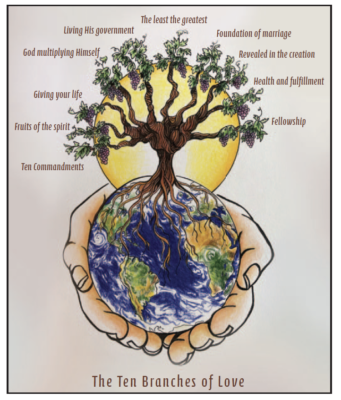
The Depths of His Love.
How can we love the Lord our God with all of our heart and soul and mind? This question has plagued me for a long time, so much so that I eventually wrote a book on the topic, entitled Do You Know What I Have Done to You? In this book I have pointed to 10 major means by which the love of God is expressed for all of us to see. These 10 points are given below.
1. Love is implicit in the Ten Commandments.
2. Love is a fruit of the spirit.
3. Love is laying down your life.
4. Love is God multiplying Himself.
5. Love is living His government.
6. Love is the least being the greatest, and the first last.
7. Love is the foundation of marriage.
8. Love is revealed in the creation.
9. Love is the granting of health and fulfillment.
10. Love is the fellowship of the saints.
If we were to explore all of these 10 chapters we would have a fairly complete synopsis of the breadth and height of God’s incredibly pervasive love. However, in this study we do not have time to address all 10 chapters in depth. Therefore, let us examine just a few of the multitude of points that impinge upon this crucially important topic of love.
1.We must literally lay down our lives for our Father and Christ, and for one another. This idea is not just a pleasant platitude. It is the reality expressed by our Savior the night he was betrayed.
“This is My commandment, that you love one another as I have love you. Greater love has no one than this, than to lay down one’s life for his friends. You are My friends if you do whatever I command you” (John 15:12-14).
That same night Christ performed a monumental feat of selfless love when he took a basin of water, got down on this knees in front of each of the twelve disciples, and washed their feet. How could the One who is credited with creating all things (John 1:3,10; Colossians 1:16; Hebrews 1:2) lower himself to the position of a servant and wash their feet? Wasn’t He the greatest of them all? That is not how His love works. Note what He told them:
“Do you know what I have done to you? You call Me Teacher and Lord, and you say well, for so I am. If I then, your Lord and Teacher, have washed your feet, you also ought to wash one another’s feet. For I have given you an example, that you should do as I have done to you. Most assuredly, I say to you, a servant is not greater than his master; nor is he who is sent greater than he who sent him” (John 13:12-16).
Put in another way, the apostle Paul stated in Philippians 2:3-5,
“Let nothing be done through selfish ambition or conceit, but in lowliness of mind let each esteem others better than himself. Let each of you look out not only for his own interests, but also for the interests of others. Let this mind be in you which was also in Christ Jesus.”
Jesus turned the world’s governmental systems upside down by showing that the one who serves by washing someone else’s feet is the greatest! The great Servant — Jesus Christ — whom the world’s system would view as the One who by all means should be served by the disciples, did not place Himself above any of the twelve and humbled Himself as a servant, saying we must likewise humble ourselves as servants by washing the feet of others. The greatest showed Himself to be the least, and the least was (and is) the greatest (Luke 9:48)!
At the end of the age it is prophesied that some of us will be delivered up to tribulation, to testify before kings and rulers, and killed, and hated by people in all nations for Christ’s names’s sake (Matthew 24:9; Luke 21:12). Like Jesus Himself and eleven of the 12 apostles, we may have to pay the ultimate price with our physical lives in order that we might bear witness to the truth. If such is to happen, we must not fear the people who would commit such a dastardly deed, but,
“And do not fear those who kill the body but cannot kill the soul. But rather fear Him who is able to destroy both soul and body in hell [geena, ‘the Valley of Hinnom of Jerusalem’]” (Matthew 10:28).
We can also give our time, money, and resources to sacrifice our lives for the sake of those in need, which as James said is pure and undefiled religion (James 1:27). Jesus included the hungry, thirsty, sick, strangers, prisoners, and naked as those we ought to provide for or visit (Matthew 25:34-36).
We fulfill the great commandment when we love our neighbor as ourself, and lay down our life for our brethren, “hating” ourselves for the sake of God’s calling and our future residence in the heavenly kingdom.
2. We must strive to truly know our heavenly Father on a personal basis. I am intrigued by how Abraham spoke often with God and other spirit beings, such as in Mamre, when Abraham negotiated for the saving of Sodom, where Lot and his family lived, by asking if He would spare the city for 50, then 45, then 30, then 20, and finally 10 righteous people who lived there (Genesis 18). He spoke one-on-one with God, as did Moses time and again. At the burning bush incident Moses reasoned with the I AM concerning his going to Egypt and speaking with Pharaoh. (Exodus 3 and 4). The prophets, judges, and some leaders and citizens of Israel spoke directly with the Eternal, or with one of His emissaries. They oftentimes saw these spirit beings manifested as flesh and blood.
While we may never see or hear God as did the patriarchs, we have the great privilege of having Him speak to us through His word, and seeing Him therefore in our mind’s eye. Indeed, when Jesus appeared to the disciples after the crucifixion, he told Thomas,
“‘Reach your finger here, and look at My hands, and reach your hand here, and put it into My side. Do not be unbelieving, but believing.’ And Thomas answered and said to Him, ‘My Lord and My God!’ Jesus said to him, ‘Thomas, because you have seen Me, you have believed. Blessed are those who have not seen and yet have believed’” (John 20:27-29).
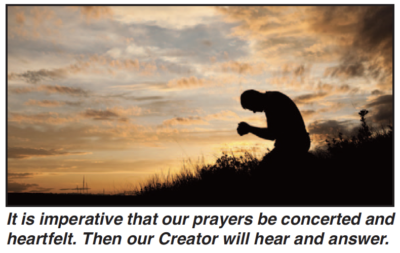
We of the elect know that the words of the Bible are true, and when we read those words it is clear that the Eternal is speaking to us. Moreover, when we pray we are speaking directly to the Father, and He hears us!
“Now this is the confidence that we have in Him, that if we ask anything according to His will, He hears us. And if we know that He hears us, whatever we ask, we know that we have the petitions that we have asked of Him” (I John 5:14-15).
“And whatever we ask we receive from Him, because we keep His commandments, and do those things that are pleasing in His sight” (I John 3:22).
“The eyes of the Lord are on the righteous, and His ears are open to their cry” (Psalm 34:15).
“The Lord is far from the wicked, but He hears the prayer of the righteous” (Proverbs 15:29).
“For I know the thoughts that I think toward you, says the Lord, thoughts of peace and not of evil, to give you a future and a hope. Then you will call upon Me and go and pray to Me, and I will listen to you. And you will seek Me and find Me, when you search for Me with all your heart” (Jeremiah 29:11-13).
“Most assuredly, I say to you, he who believes in Me, the works that I do he will do also; and greater works than these he will do, because I go to My Father. And whatever you ask in My name, that I will do, that the Father may be glorified in the Son” (John 14;12-13).
It is essential that we seek our great Creator God with our whole heart, with every fiber of our being (Psalm 9:1; 111:1; 119:2, 34, 58, 69, 145; 138:1; Deuteronomy 4:20). When we do this, our Creator has promised to protect us and deliver us, as He says in Psalm 34:7, “The angel of the Lord encamps all around those who fear Him, and delivers them.”
The more we speak to our heavenly Father and read His word, the more we get to know Him personally. Since He is love, we also come closer to the express personality embodied in love, which His Son Jesus Christ lived on this earth. It is the type of relationship that husbands and wives should enjoy, even as our head is Christ, Christ’s head is the Father, and the wife’s head is the husband (I Corinthians 11:1).
“So husbands ought to love their wives as their own bodies; he who loves his wife loves himself. For no one ever hated his own flesh, but nourishes and cherishes it, just as the Lord does the church. For we are members of His flesh and of His bones” (Ephesians 5:28-30).
3. The creation in all of its myriad of varieties and intricacies is a tribute and revelation of our Father’s love to us. As stated in Romans 1:20, “… His invisible attributes are clearly seen, being understood by the things that are made, even His eternal power and Godhead ….” Love is certainly a prime attribute of our Creator which is revealed throughout the created world; that includes humankind at the apex of that creation, humans who are made in the Eternal’s express image. Let us look briefly at just two of these marvels of creation to start appreciating the incredible extent of God’s love.
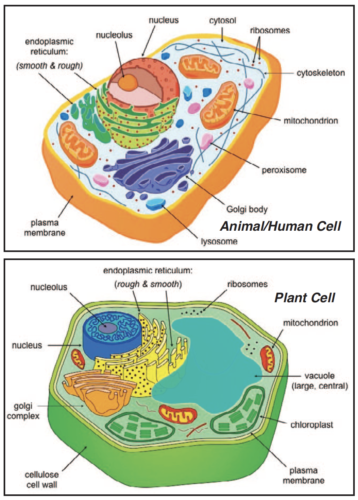
The Cell
All living things are comprised of cells, from single-cell organisms like bacteria and protozoa to multicellular organisms such as humans. A single person may be comprised of about 10 trillion cells.
Each cell is an independent universe, extracting needed elements, water, oxygen, and biochemicals from the blood capillaries and excreting toxic waste ubstances and carbon dioxide back into the blood. Each particular cell type within an organ is programmed to perform the function it was designed for, based on its position within the organism: cells of muscles, blood, brain, liver, kidney, vessels, panaceas, bone, lymph, endocrine glands, and many other tissues. Each cell contains a nucleus, nucleolus, endoplasmic reticulum, lysosomes, Golgi apparatus, mitochondria, ribosomes, microtubules, and other organelles which work together in harmony to maintain the life of the cell, besides enabling it to perform its specialized tasks for which it is programmed by the DNA in the nucleus, and by the spirit essence of those cells and organs. The harmony of the individual cell parts enables the cell to live — and also divide to form sister cells when needed — a mutualism within the cell that then transcends into a beautiful harmony amongst all of the organs that the cells constitute for an entire body. Thus, the liver cells, brain cells, blood cells, skin cells … and on the list goes, each comprise the organs to complete the complex, interdependent, mutualistic functioning of the entire body. The spiritual analogy of the physical body to the spiritual body is entirely appropriate, as Paul outlines in I Corinthians 12.
Plant cells are very similar to animal cells in their functions, except that most of them contain chloroplasts which encase chlorophyll molecules and their associated compounds. These are essential to capture sunlight energy and incorporate it into carbon compounds for building structural and functional compounds within the plant. These cells also usually contain a large vacuole. As for animal cells, the various organelles operate symphonically in mutualistic fashion — as mediated by DNA in the nucleus and by their position in the plant. Each organelle enables the others to function as water, minerals, carbon dioxide, biochemicals, and sunlight conspire to build the structural and functional compounds that make life possible, for the plants themselves and for the animals that depend on them. Animals could not exist were it not for those plant cells capturing sunlight and synthesizing the organic proteins, carbohydrates, fats, vitamins, and many other food substances that animals and mankind must ingest to live.
Moreover, it may be said that the plant kingdom — in particular edible plants — serve mankind and animals by producing food crops from the soil and sun, while at the same time generating life-giving oxygen from within the photosynthetic pathways of the chloroplasts. Both the food crops we eat and the oxygen we breathe are the result of these marvelous synthetic pathways. This is perfect love in action! The source of energy — the sun — is fixed into the food substances that multiply and sustain life for plant, beast, and man. The concept of service and love is built into the entire fabric of the creation. It is present at every level: within the cells, within and among the organ systems of both plants and animals, and between the various species of plants and animals that depend on one another for survival.
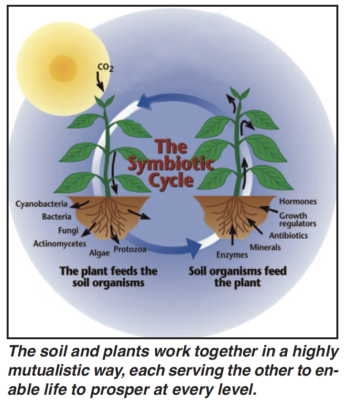
Plants and Soils
As a soil scientist, I am utterly awestruck at how wonderfully intertwined are the living systems of the soil and the plants that grow on them. Through many years of study I have come to understand how plants capture sunlight energy for growing their cells, tissues, and organs, capturing that electromagnetic energy to synthesize compounds using carbon dioxide through a series of complex, highly ordered biochemical reactions. While some of these compounds are used to build leaves, stems, flowers, and other plant parts, up to 40% or more of the plant’s photosynthate is channeled down the stem (or tree trunk) and into the roots in vessel elements known as phloem. These compounds build roots, but also a goodly portion of these compounds is excreted along root surfaces into contact with the soil, where a vast array of fungi, bacteria, actinomycetes, protozoa, algae, mycorrhizal fungi, and other microscopic microbes feed on this energy. In the process, they metabolize the carbon compounds in the exudate into vitamins, antibiotics, growth regulators, hormones, available nutrients, and other compounds that are then taken up by the roots to enhance plant growth. Note the figure on the left that illustrates this process. Without this selfless serving symbiotic relationship most plants grow very poorly, or not at all. The loving mutualism of plants and soils is thus shown to exist wherever a green plant grows! We are literally surrounded by the evidences of our Creator’s deeply abiding lovingkindness, leaving no excuse for people who are aware of these relationships to not acknowledge the God who placed them there.
We grow to love our Creator by studying the intricacies of the created world. There His love is openly manifested in the most marvelous ways! The more we know of that creation, the better we know our heavenly Father, and the closer we look, the more awesome this creation appears!
4. We grow to love our Creator by obeying Him, doing His will from the heart of our own free will, a will that has been captured by the holy spirit given by the Father. The Israelites had the law, which they were cautioned to obey because of the blessing that would automatically accrue to them, lest they fall into diverse tribulations as spelled out in Leviticus 26:14-39 and Deuteronomy 28:15-68. Most of the Israelites, however, did not possess the spirit of God and were not internally convicted to keep it as we are. They were required to wear tassels on their garments so they would “… look at and remember all the commandments of the Lord, so as to do them and not follow after your own heart and your own eyes … and be holy to your God” (Numbers 15:39, 41; see also Deuteronomy 22:12).
We as God’s holy people have the laws of God written in our hearts (Hebrews 8:10-12). They are an integral part of our character now, a consequence of that spirit within us, implanted in our hearts and minds so we will desire to do them and show forth the good works we are required to do. While we have been called and saved through the Father’s calling and graciousness of granting us His spirit, the result in our lives is to flee from sinful thoughts, words, and deeds. Notice Galatians 2:8-10.
“For by grace you have been saved through faith, and that not of yourselves; it is the gift of God, not of works, lest anyone should boast. For we are His workmanship, created in Christ Jesus for good works, which God prepared beforehand that we should walk in them.”
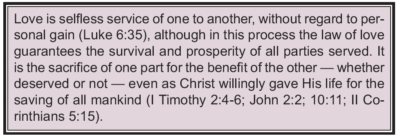
We must practice “true religion, undefiled,” serving the needy, the orphans, widows, sick, hungry, thirsty, and naked, those in prison, and strangers (James 1:27; Matthew 25; 34-36). We must use our spiritual gifts to serve our brethren (I Corinthians 12; I Peter 4:10; Romans 12:4-8), and never forget to humble ourselves before God and others … for it is to this person that our Creator grows close (Issiah 66:2; Philippians 2:3-5; Romans 12:16).
Look what Paul says we should do in Romans 12.
- Be a living sacrifice to God.
- Have a transformed mind, not the world’s mind.
- Seek the perfect will of God.
- Come to understand who you are as a person before God.
- Utilize your spiritual gifts to serve one another.
- Practice sincere love.
- Abhor evil.
- Cling to the good.
- Be kindly affectionate to one another in brotherly love, preferring one another.
- Be fervent in spirit to serve God.
- Rejoice in hope.
- Patiently endure trials.
- Pray continually.
- Provide for the needy.
- Be hospitable to the brethren and to all people.
- Do good to those who persecute you; overcome evil with good.
- Rejoice with those who rejoice, and weep with those who weep.
- Be of a unified mind with the brethren.
- Do not become proud and wise in your own opinions.
- Associate with humble people.
- Live at peace with everyone.
These qualities are of the mind of God and His love. These qualities are of the spirit that lives within us. Let us do them and rejoice always!

